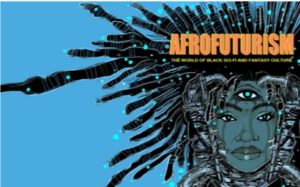 Week Three: Afrofuturism and The Posthuman
Week Three: Afrofuturism and The Posthuman
Days 5 & 6
Overview: This week expands on week one’s definition of the posthuman and week two’s strategic knowledge of reading texts for its critique of our society. It also introduces students to a branch of science fiction that often utilizes posthuman elements, even as Afrofuturism is its own SF sub-genre.
Day 5 [75 minutes]
| Reading(s):
● Yaszek, Lisa. “Afrofuturism in American Science Fiction.” The Cambridge Companion to American Science Fiction, edited by Gerry Canavan and Eric Carl Link, Cambridge University Press, Cambridge, 2015, pp. 58–69. Cambridge Companions to Literature. ● “Can You Wear My Eyes” by Kalamu ya Salaam in Thomas, Sheree. Dark Matter: A Century of Speculative Fiction from the African Diaspora (Aspect, 2000).
|
| Objective(s):
· Define Afrofuturism; identify common themes of the genre and examine how they are explored through SF. · Learn how to see literary works as participants within schools of conceptual thinking on race, culture and technology.
|
| Agenda:
· 10 minutes: First Impressions of “Afrofuturism in American Science Fiction” and “Can You Wear My Eyes”— Brief discussion: identify challenges/questions in the reading · 20 minutes: Class Discussion Questions Yaszek: What are the three characteristics of Afrofuturistic writing according to Yaszek? How does Yaszek characterize contemporary Afrofuturistic writing, and what does she outline as the interests of these authors? How do they “update the classic character of the black genius” (65)? What does this contemporary writing help us to investigate? What is the purpose of chronopolitical reading? Does this strategy offer room for modern critique? · Break 5 minutes · 35 minutes: Activity: Students should break into three groups and identify a passage for close reading that supports each prompt below: Identify Reggie’s inability to cope with “woman-sight” and what this means Identify how sight is connected to experience Explain what causes Reggie to violently blind himself Explain how this is a useful posthuman story for gender critique Each group should spend 10 minutes on each prompt before presenting the passage to the class for full discussion. · 5 minutes: Wrap Up and Preview for Day 6
|
Day 6 [75 minutes]
| Reading(s):
· “The Evening and the Morning and the Night” including Afterword by Octavia E. Butler in Thomas, Sheree. Dark Matter: A Century of Speculative Fiction from the African Diaspora (Aspect, 2000).
|
| Objective(s):
· Learn how to see literary works as participants within schools of conceptual thinking on race, culture, anti-blackness, misogyny and technology; identify where text is critiquing society. |
| Agenda:
· 10 minutes: First Impressions—Brief discussion and questions on the text · 40 minutes: Activity: Students should break into 3/4 groups and identify passages for close reading from each prompt and offer comparisons from previous readings in the first session. 10 minutes in groups and 30 minutes to discuss passages. Choose from prompts: Discuss the religious elements in the texts, including story title Discuss the violence of self-mutilation and its significance as it is described in the text Discuss Butler’s afterword and her investigation of what is socialized versus genetic behavior Conduct a chronopolitical reading of a passage and or argue how these characters “update our understanding of the black genius” according to Yaszek · Break 5 minutes · 15 minutes: Open ended class discussion on what critiques the text highlight of our society and race. · 5 minutes: Wrap up and ask students to summarize what they learned in class
|
